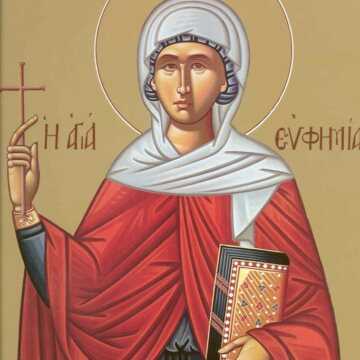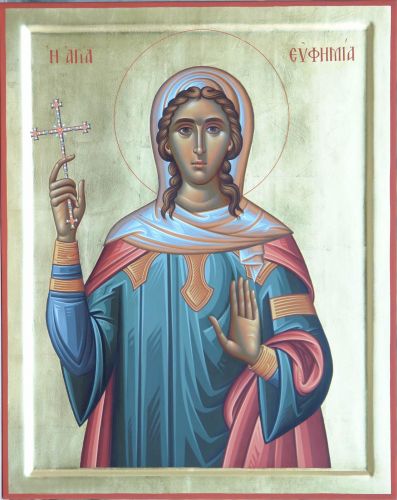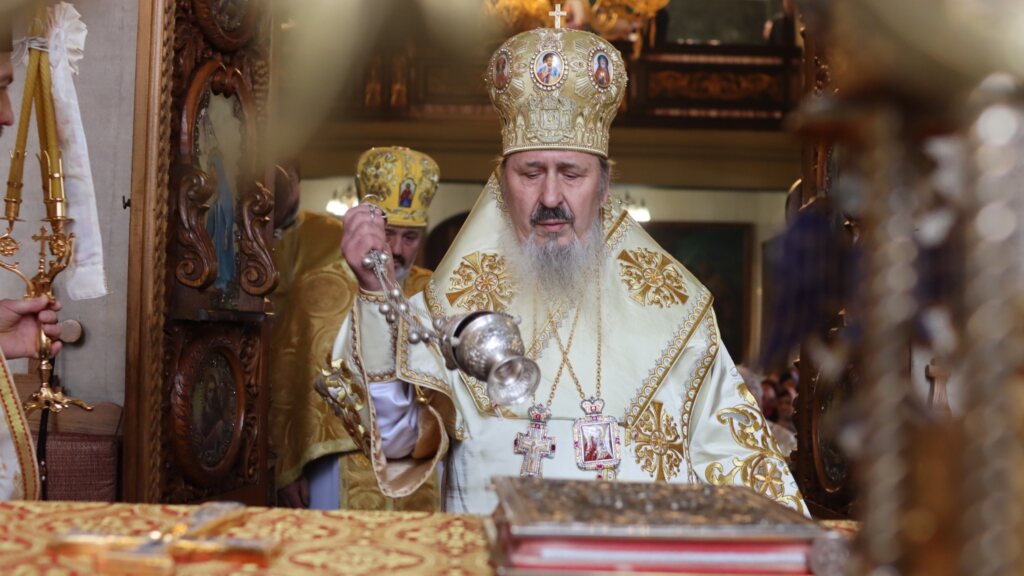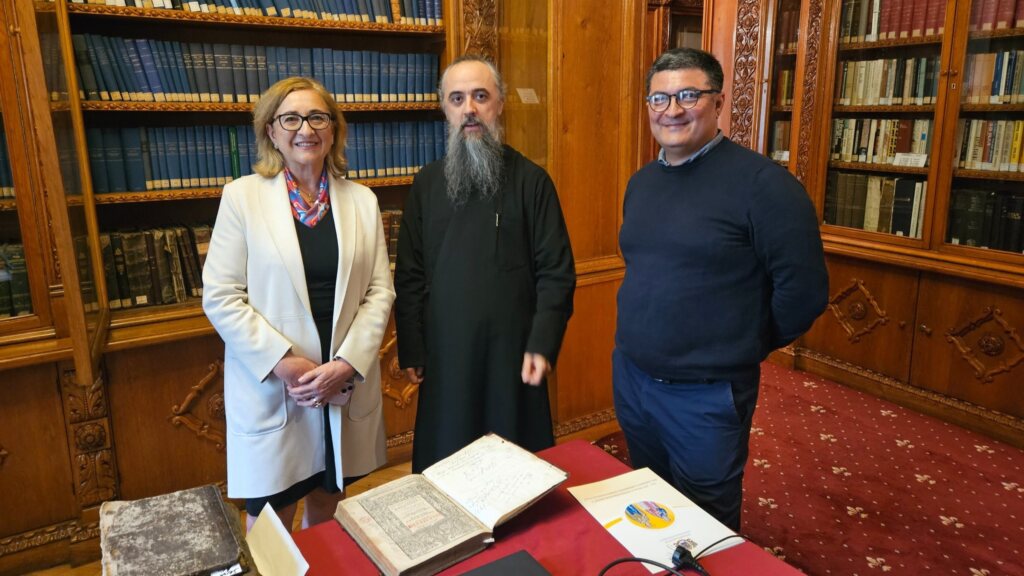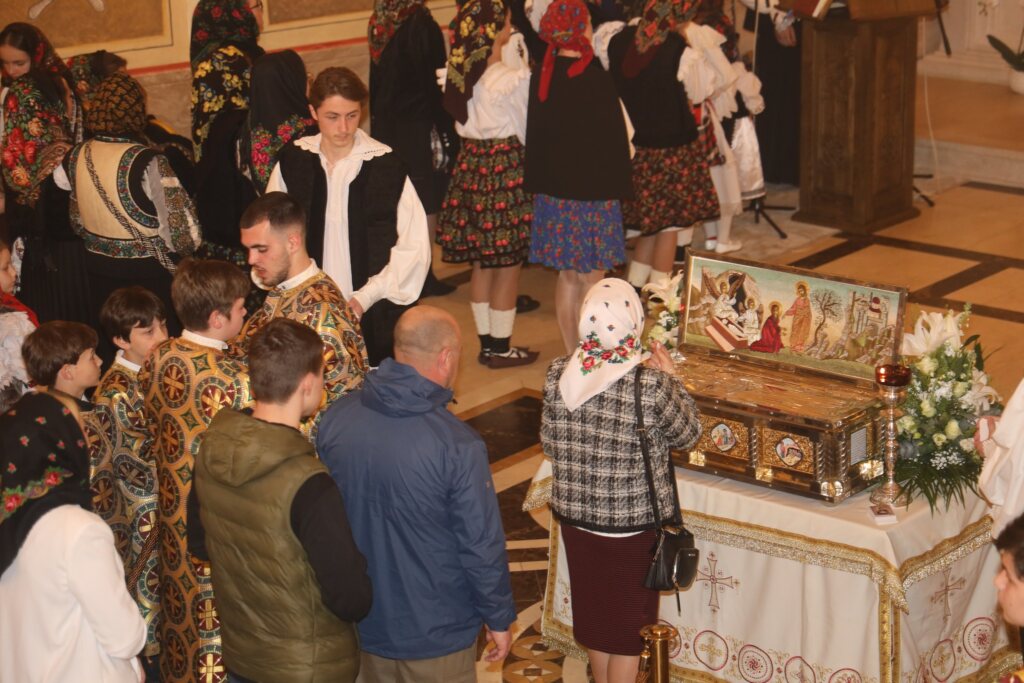The Holy Great Martyr Euphemia the All-Praised
She was the daughter of Christians, the senator Philophronos and Theodosia. She suffered for Christ in the year 304 in the city of Chalcedon, on the banks of the Bosphorus opposite Constantinople.
The Chalcedon governor Priscus circulated an order to all the inhabitants of Chalcedon and its surroundings to appear at a pagan festival to worship and offer sacrifice to an idol of Ares, threatening grave torments for anyone who failed to appear. During this impious festival, 49 Christians were hidden in one house, where they secretly attended services to the True God.
The young maiden Euphemia was also among those praying there. Soon the hiding place of the Christians was discovered, and they were brought before Priscus to answer for themselves. For nineteen days the martyrs were subjected to various tortures and torments, but none of them wavered in their faith nor consented to offer sacrifice to the idol.
The governor, beside himself with rage and not knowing any other way of forcing the Christians to abandon their faith, sent them for trial to the emperor Diocletian. He kept the youngest, the virgin Euphemia, hoping that she would not remain strong if she were all alone.
Saint Euphemia, separated from her brethren in faith, fervently prayed the Lord Jesus Christ, that He strengthen her in her impending ordeal. Priscus at first urged the saint to recant, promising her earthly blessings, but then he gave the order to torture her.
The martyr was tied to a wheel with sharp knives, which cut her body. The saint prayed aloud, and as it happened, the wheel stopped by itself and would not move even with all the efforts of the executioners. An angel of the Lord, came down from Heaven, removed Euphemia from the wheel and healed her of her wounds. The saint gave thanks unto the Lord with gladness.
Not perceiving the miracle that had occurred, the torturer ordered the soldiers Victor and Sosthenes to take the saint to a red-hot oven. But the soldiers, seeing two fearsome angels in the midst of the flames, refused to carry out the order of the governor and became believers in the God Whom Euphemia worshipped.
Boldly proclaiming that they too were Christians, Victor and Sosthenes bravely went to suffering. They were sent to be eaten by wild beasts. During their execution, they cried out for mercy to God, asking that the Lord would receive them into the Heavenly Kingdom.
A heavenly Voice answered their cries, and they entered into eternal life. The beasts, however, did not even touch their bodies.
Saint Euphemia, cast into the fire by other soldiers, remained unharmed. With the help of God she emerged unharmed after many other tortures and torments. Ascribing this to sorcery, the governor gave orders to dig out a new pit, and filling it with knives, he had it covered over with earth and grass, so that the martyr would not notice the preparation for her execution.
Here also Saint Euphemia remained safe, easily passing over the pit. Finally, they sentenced her to be devoured by wild beasts at the circus. Before execution the saint began to implore that the Lord deem her worthy to die a violent death.
But none of the beasts, set loose at her in the arena, attacked her. Finally, one of the she-bears gave her a small wound on the leg, from which came blood, and immediately the holy Great Martyr Euphemia died.
During this time there was an earthquake, and both the guards and the spectators ran in terror, so that the parents of the saint were able to take up her body and reverently bury it not far from Chalcedon.
A majestic church was afterwards built over the grave of the Great Martyr Euphemia. At this temple the sessions of the Fourth Ecumenical Council took place in the year 451. At that time, the holy Great Martyr Euphemia confirmed the Orthodox confession in a miraculous manner, and exposed the Monophysite heresy. Details of this miracle are related under July 11.
With the taking of Chalcedon by the Persians in the year 617, the relics of the holy Great Martyr Euphemia were transferred to Constantinople (in about the year 620). During the Iconoclast heresy, the reliquary with the relics of Saint Euphemia appears to have been thrown into the sea. Pious sailors recovered them.
They were afterwards taken to the Island of Lemnos, and in the year 796 they were returned to Constantinople.
Troparion, tone 4:
Your lamb Euphēmia calls out to You, O Jesus, in a loud voice: “I love You, my Bridegroom, and in seeking You I endure suffering. In Baptism I was crucified so that I might reign in You, and I died so that I might live with You. Accept me as a pure sacrifice, for I have offered myself in love.” Through her prayers, save our souls, since You are merciful.
Holy Martyr Melitina
She lived in the city of Marcianopolis in Thrace during the rule of the emperor Antoninus Pius ((138-161). She was a fervent Christian, and the Lord blessed her with the gift of wonderworking. By the power of her prayers she shattered the idols of Apollo and Herakles.
Her fiery preaching converted many pagans to Christ. Antiochus, the governor of the city of Marcianopolis, ordered that she be tortured, since this holy woman could not be persuaded to deny Christ. She was handed over to the governor’s women who tried to convert her by flattery and kindness.
Not only was Saint Melitina not deceived or softened by their efforts, but she made Christians of the governor’s women. When the governor learned of this, he had Saint Melitina brought to trial, and sentenced her to be beheaded.
A Christian named Acacius reverently took the martyr’s body with the intention of burying her in his homeland of Macedonia. During the voyage, however, Acacius fell sick and died. The ship stopped at the island of Limnos, where the body of Saint Melitina was buried. The martyr-loving Acacius was laid to rest beside her grave.
Troparion — Tone 3
Your holy martyr Melitίnē, O Lord, / through her sufferings has received an incorruptible crown from You, our God. / For having Your strength, she laid low her adversaries, / and shattered the powerless boldness of demons. / Through her intercessions, save our souls!
Holy Martyr Ludmilla
A Czech (Bohemian) princess, was married to the Czech prince Borivoy. Both spouses received holy Baptism from Saint Methodius, Archbishop of Moravia and Enlightener of the Slavs (Comm. 11 May).
As Christians, they showed concern for the enlightening of their subjects with the light of the true Faith, they built churches and invited priests to celebrate the divine services. Prince Borivoy died early at age 36. Saint Ludmilla, as a widow, led an austere, pious life and continued to be concerned for the Church during the reign of her son Bratislav, which lasted for 33 years.
Bratislav was married to Dragomira, with whom he had a son, Vyacheslav. After the death of Bratislav, eighteen-year-old Vyacheslav came on the throne. Taking advantage of the inexperience and youth of her son, Dragomira began to introduce pagan manners and customs in the country.
Saint Ludmilla, of course, opposed this. Dragomira came to hate her mother-in-law and tried to destroy her. When Saint Ludmilla moved away to the city of Techin, Dragomira sent two boyars in secret to murder her. Saint Ludmilla was praying at the time, and the two assassins entered the house and carried out Dragomira’s orders.
The relics of the holy Martyr Ludmilla was buried in Techin in the city wall. Numerous healings occurred at her grave. Prince Vyacheslav transferred the body of Saint Ludmilla to the city of Prague and placed it in the church of Saint George.
Troparion — Tone 3
Your holy martyr Ludmilla, O Lord, / through her sufferings has received an incorruptible crown from You, our God. / For having Your strength, she laid low her adversaries, / and shattered the powerless boldness of demons. / Through her intercessions, save our souls!
Tr by oca.org
